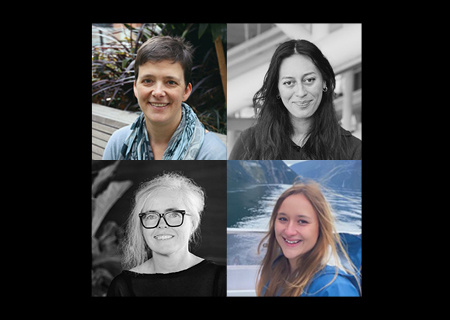Pōneke to the Pacific: the future of cities in our region
A panel discussion from:
Prof Libby Porter, RMIT, Australia
Eljyana Roach, Project Lead, Central Pacific Collective
Antonia van Sitter, (Ngāpuhi, Ngāti Whakaue, Pākehā) Final year architecture student at Te Herenga Waka, Victoria University
Nicole Thompson, Principal Landscape Architect, Wraight + Associates Ltd
This month’s City Talk has been a collaboration with SOAC conference.
SOAC 2023 will examine our Indigenous, trans-Tasman and Asia-Pacific futures, exploring the transitions and transformations necessary for creating cities and communities that respond to Australasian challenges and reflect our distinctive geographies. Seen in this context there is a need to revitalise indigenous knowledges, confront colonial legacies, and support inclusive, progressive city identities more explicitly linked to our place in the world. Key challenges include established themes such as social inequality, demographic shifts, population mobility, infrastructure, the growing housing crisis and climate change. Responding to these intertwined urban futures also means recognising that Australasia cities and communities are increasingly ‘living on the edge’, with coastal adaptation and development, disaster preparedness and the growing instability of biological and environmental systems placing new stresses on living and demanding new ways of framing life
For the first time in its 20-year history, the conference will be held in Aotearoa New Zealand, and is hosted by Te Herenga Waka- Victoria University of Wellington in partnership with all universities across the motu and an Indigenous Caucus.
Early details of the conference theme including the call for abstracts and track co-chairs and themes can be found here.
City Talks is an ongoing series initiated by Te Kāhui Whaihanga Wellington Branch and presented in partnership with City Gallery.
The talk will be followed by refreshments.
Professor Libby Porter
Professor Libby Porter is a scholar in planning and urban geography, in Sustainability and Urban Planning and the Centre for Urban Research, RMIT University. As a coloniser living on stolen lands and benefiting from the dispossession of First Peoples, her work attempts to expose displacement and dispossession processes in cities. She has contributed to debates about the responsibility of planning and urban development to First Peoples sovereignty, as well as the displacement outcomes of urban regeneration. She is the author of many books and papers including Unlearning the Colonial Cultures of Planning (2010 Ashgate), Planning for Coexistence? (with Janice Barry) and Planning in Indigenous Australia: From imperial foundations to postcolonial futures with Sue Jackson and Louise Johnson.
Libby has worked in planning and urban policy practice, and taught in planning and geography schools at the Universities of Birmingham, Sheffield, Glasgow, Monash and RMIT. She is a Fellow of the Higher Education Academy UK and has helped found and been active in many grassroots collectives and initiatives to catalyse action in the face of urban injustice including Planners Network UK, the Save Public Housing Collective, and the International Network of Urban Research and Action.
Elyjana Roach
Elyjana is an architect and urban designer, originally from Aotearoa, Samoa, and Australia. She is a Fulbright Scholar and graduated with Distinction from Harvard’s Graduate School of Design with a Master of Architecture in Urban Design. She currently holds the 2022 Druker Traveling Fellowship from Harvard for her current research on Contemporary Pacific Urban Villages. Elyjana received her Master of Architecture from Victoria University of Wellington with a NZIA Student Design Award for her thesis based in her hometown, Porirua. She has taught at Victoria University as an architecture instructor and at Harvard GSD as an urban design co-coordinator and instructor for the Design Discovery Program 2022. Elyjana is currently based in Wellington, New Zealand, as a Project Lead for the design and development of the Our Whare Our Fale, a wellbeing and housing development, with Central Pacific Collective, set to deliver up to 300 affordable, fit-for-purpose homes for Pacific families in Eastern Porirua.
Antonia van Sitter
(Ngāpuhi, Ngāti Whakaue, Pākehā)
Nō te Wharetapu o Ngāpuhi ahau ki te taha o tōku māmā. Nō Hōrana ia ki te taha o tōku pāpā. Nō Rotorua ahau. Ka tino hono ahau ki Te Rotoiti-kite-a-Ihenga. Kei Te Whanganui-a-Tara ahau e noho ana.
Antonia is in her final year of architectural studies at Te Herenga Waka Victoria University where her research investigates marae resilience in the face of climate change. She has recently been selected as a participant in the NZIA Student Design Awards, for the thesis titled ‘toitū te whenua, toiora te wai, toitū te marae’. The topic is fuelled by changing environments, what this means for Māori, and what could be learnt by foregrounding indigenous practices within architectural methodologies. Her design research is grounded in TikaLAB which takes it’s critical conceptualisation from climate change, settler colonisation, and mana motuhake inspired indigenising practices with kaupapa Māori as the overarching orientation.
Nicole Thompson
Nicole, landscape architect and director of Wraight + associates (WA), is a somewhat geographically confused dingo that fell for Farewell Spit and many other wonders of i te whenua o Aotearoa. Whether it be realising a city’s ambitious Green and Blue Network Plan or considering where best to put a hosetap, Nicole loves a puzzle and can think of few things more satisfying than working with others to shape/harness/amplify/protect the complex puzzle that is our environment.


